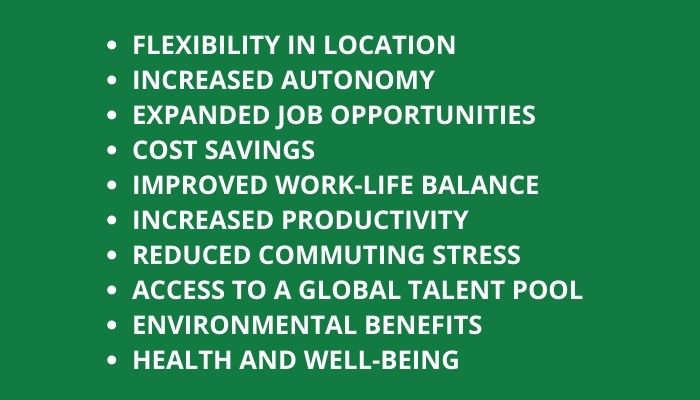Welcome to the era of remote work, where flexibility and convenience are the names of the game. In recent years, working remotely has skyrocketed in popularity, transforming how we approach our professional lives.
Whether you’re a seasoned remote worker or just dipping your toes into this new work paradigm, understanding the pros and cons is essential to making the most of this flexible arrangement. So, let’s embark on a journey to explore the exciting world of remote work and discover its advantages and challenges.
Exploring the Practicality of Remote Work: Is it a Viable Option?

Curiosity often arises among individuals and organizations about the practicality of remote work. So it’s natural to wonder if working remotely is genuinely feasible. To begin with, remote work tools offer the remarkable benefit of eliminating the daily commute and the time spent traveling to a physical workplace.
However, it’s essential to acknowledge that discipline can sometimes waver when working remotely. Like any work arrangement, remote work has advantages and disadvantages that should be noticed.
Before embarking on the exciting journey of transitioning from a traditional in-house work environment to remote work, it’s essential to take a friendly and thoughtful approach by considering both the positive and negative aspects.
So, let’s dive in and explore the pros and potential challenges of working remotely. By doing so, we can better understand the practicality of remote work and make informed decisions about its suitability for our unique circumstances.
Unveiling the Pros and Cons of Working Remotely
Like any other employment setup, remote work or telecommuting has advantages and disadvantages. Therefore, it is crucial for individuals new to remote work or considering a transition to this work style to carefully evaluate the primary benefits and drawbacks of working remotely.
The following points outline the key pros and cons of embracing a remote work lifestyle:
Pros of Working Remotely

- Flexibility in Location
One of the primary benefits of remote work is the ability to work from anywhere. Whether it’s your home, a co-working space, or a coffee shop, remote work allows you to choose your preferred work environment.
This flexibility can enhance productivity and work-life balance, as it eliminates commuting time and provides the opportunity to create a personalized workspace.
- Increased Autonomy
Working remotely often grants individuals more control over their schedules and workflows. With fewer interruptions from colleagues and a flexible workday structure, remote workers can tailor their work hours to align with their peak productivity times. This autonomy can lead to better focus and job satisfaction.
- Expanded Job Opportunities
Remote work breaks down geographical barriers and opens up job opportunities previously limited by location. For example, employees can now work for companies or clients from different cities, countries, or continents.
This increased accessibility allows individuals to explore a broader range of career options and find positions that align with their skills and interests.
- Cost Savings
Remote work can lead to significant cost savings for both employees and employers. For example, employees can save money on transportation, lunches, and other miscellaneous costs with no commuting expenses, reduced spending on work attire, and the potential to work from home.
Similarly, employers can cut office space, utilities, and supplies costs.
- Improved Work-Life Balance
Remote work provides an opportunity to strike a healthier work-life balance. Remote workers can allocate more time to personal pursuits, family, and self-care without the need to be physically present in an office.
The flexibility to schedule work around personal commitments can reduce stress levels and increase overall satisfaction.
- Increased Productivity
For some individuals, working remotely can lead to increased productivity. With fewer office distractions, shorter commutes, and the ability to create an optimal work environment, remote workers often find themselves more focused and efficient. In addition, They can customize their workspace and eliminate interruptions, leading to enhanced concentration and output.
- Reduced Commuting Stress
Commuting to and from the office can be stressful, especially in busy urban areas. Remote work eliminates the daily commute, saving valuable time and reducing stress associated with traffic, public transportation delays, or crowded trains and buses. This newfound time and reduced commuting stress can contribute to a more positive mindset and increased overall well-being.
- Access to a Global Talent Pool
Companies that embrace remote work can tap into a global talent pool. Instead of being limited to hiring locally, businesses can attract top talent from around the world. Effectively managing a global workforce ensures that businesses can leverage diverse skills and perspectives, driving innovation and creativity within the organization.
- Environmental Benefits
Remote work has positive environmental implications. With fewer employees commuting to the office, there is a reduction in greenhouse gas emissions and traffic congestion.
Additionally, companies adopting remote work policies may require less office space, leading to decreased energy consumption and resource usage. These eco-friendly aspects of remote work contribute to greener and more sustainable work culture.
- Health and Well-being
Remote work can have positive effects on employee health and well-being. Without the stress of commuting and the flexibility to structure their day, individuals have more opportunities to prioritize self-care activities such as exercise, healthy meals, and breaks.
Furthermore, remote work can accommodate individuals with specific health needs or disabilities, providing a more inclusive and accessible work environment.
Cons of Working Remotely

- Limited Face-to-Face Interaction
Remote work can lead to a sense of isolation and reduced social interaction. Conversely, in-person communication and collaboration may help the development of personal relationships with colleagues, potentially impacting teamwork and employee engagement.
Maintaining effective communication channels and video conferencing tools can help mitigate this challenge.
- Potential for Distractions
Working remotely requires self-discipline and the ability to manage distractions effectively. With the comforts of home or other non-office environments, there may be temptations to engage in non-work activities or face interruptions from family members or household chores.
Establishing a dedicated workspace and setting clear boundaries help minimize distractions and maintain focus.
- Blurred Work-Life Boundaries
While remote work can enhance work-life balance, it can blur the boundaries between work and personal life. With a clear separation between the two, switching off from work-related tasks can be more accessible, leading to potential burnout. Setting boundaries, establishing a routine, and creating a designated workspace within the home can help maintain healthy work-life integration.
- Lack of Team Collaboration
Collaborating with team members remotely may pose challenges, especially when it comes to brainstorming, problem-solving, or building camaraderie. However, face-to-face interactions often foster stronger relationships and facilitate effective collaboration.
Employing digital collaboration tools, scheduling regular team meetings, and fostering a culture of open communication can help overcome this limitation.
- Dependence on Technology
Working remotely heavily relies on technology and a stable internet connection. Technical issues or connectivity problems can disrupt workflow and lead to frustration. Remote workers must be equipped with the necessary tools, have backup plans for internet outages, and be proactive in resolving technical difficulties.
Maintaining Remote Team Efficiency with Onethread

In today’s fast-paced digital landscape, remote work has become the new norm for many organizations. However, while working remotely offers flexibility and freedom, it presents unique team collaboration and productivity challenges. That’s where Onethread comes in.
Onethread is a powerful platform designed to streamline communication, enhance collaboration, and maintain efficiency within remote teams. Its user-friendly interface and robust features simplify the remote work experience, ensuring seamless coordination and productivity across the group.
One of the critical features of Onethread is its centralized communication hub. Instead of relying on scattered email threads or multiple chat platforms, Onethread brings all team communication into one centralized space. This enables real-time messaging, file sharing, and discussion threads, making it easy for team members to collaborate and stay organized.
Conclusion
Working remotely offers numerous advantages, including location flexibility, increased autonomy, expanded job opportunities, cost savings, and improved work-life balance. However, it also presents challenges such as limited face-to-face interaction, potential distractions, blurred work-life boundaries, lack of team collaboration, and dependence on technology.
Considering these pros and cons will help you make an informed decision about whether remote work aligns with your work style and preferences. Ultimately, it is crucial to strike a balance that suits your individual needs and maximizes productivity and well-being.
